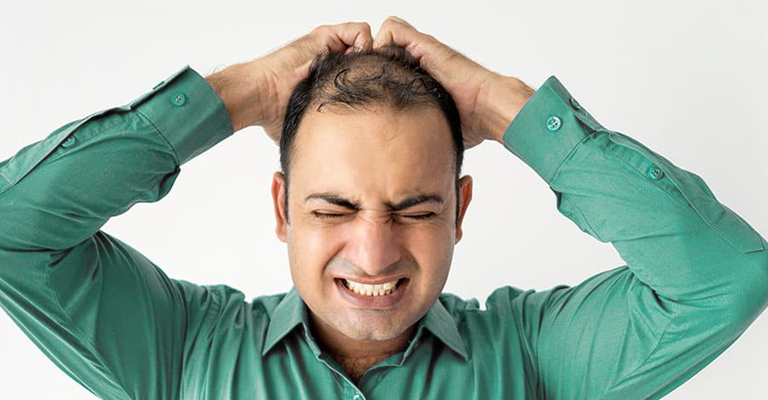21st-century life is an extremely busy place. Everyone is constantly endeavoring to find a better life, a career and passions. The one thing that often gets overlooked in this humdrum of a busy life is stress. Stress can profoundly impact the body, leading to a wide range of health issues, including hair loss, yet people continue to undermine its effect on the human body!
The relationship between hair loss and stress is complex and multifaceted. Stress can trigger many hair loss problems that occur when the body is under severe stress. These conditions may cause your hair to fall out in clumps, leaving the scalp looking patchy and thin. Chronic stress can also lead to hormonal imbalances that can contribute to hair loss, particularly in women. In this blog post, we will explore the relationship between hair loss and stress, the types of stress-related hair loss, and tips for managing stress and preventing hair loss.
Demystifying Hair Loss and Stress
When your body is under stress, it produces “stress hormones” such as adrenaline and cortisol to prepare for a perceived threat. Adrenaline increases your heart rate, blood pressure, and energy levels, while cortisol releases glucose into your system and improves your brain’s efficiency. These responses are useful in dangerous situations but also shut down non-essential body functions like hunger, sleep, and reproduction.
The link between stress and hair loss can be explained by the fact that the production of stress hormones, including cortisol, remains high during chronic stress. Corticosterone, a type of cortisol, has been found to affect hair growth, and elevated levels of this hormone can lead to thinning hair or worsening hair loss. However, not everyone who experiences stress will necessarily lose their hair, as the relationship between stress and hair loss is complex and multifaceted.
The Types of Stress Related Hair Loss
There are several types of stress-related hair loss, each with unique characteristics and treatment options. Here are some of the most common types:
Telogen Effluvium: This type of hair loss occurs when stress causes hair follicles to enter the resting phase of the hair growth cycle, known as telogen. As a result, hair begins to fall out in clumps several months after the stressful event. This type of hair loss is typically temporary and can be treated with stress management techniques.
Alopecia Areata: This autoimmune disorder occurs when the immune system attacks hair follicles, causing hair to fall out in patches. Stress is thought to trigger this condition, although the exact cause is not fully understood. Treatment options include corticosteroids and other medications that suppress the immune system.
Trichotillomania: is a compulsive disorder characterized by the urge to pull out one’s hair, often in response to stress or anxiety. Over time, this behavior can lead to significant hair loss, particularly on the scalp, eyebrows, and eyelashes. Treatment options include cognitive-behavioral therapy and medications.
Androgenetic Alopecia: This genetic condition can be triggered by stress. It is characterized by progressive hair thinning, particularly on the crown and temples. Treatment options include medications such as minoxidil and finasteride.
It’s important to note that stress-related hair loss can significantly impact a person’s self-esteem and quality of life. If you are experiencing hair loss and think it may be related to stress, it’s important to talk to a healthcare provider to determine the underlying cause and explore treatment options. In addition, practicing stress management techniques such as exercise, meditation, and relaxation can help to reduce stress levels and promote healthy hair growth.
Tips on Managing Stress to Prevent Hair Loss
While your life is important, your health is crucial to your well-being. Hence you must include methods to manage stress properly. Here are some effective tips that have worked for our patients in the past:
Exercise Regularly: There is absolutely no better alternative to regular exercise to manage your stress and improve your fitness. A regular fitness regimen improves your metabolism and promotes healthy hair growth; especially when you enter your late 30s. Creating a specific regimen is the best thing you can do for your body!
Practice Relaxation Techniques: Relaxation techniques such as deep breathing, meditation, and yoga can help to reduce stress and promote relaxation. These techniques focus on breathing, and they help calm your mind significantly. Coupled with a good exercise regimen, relaxation techniques can do wonders for your body.
Get Enough Sleep: Sleep is essential for overall health and can help to reduce stress levels. Aim for 7-9 hours of sleep each night. Eat a Healthy Diet: A healthy diet with plenty of fruits, vegetables, lean protein, and whole grains can provide the nutrients necessary for healthy hair growth.
Manage Time Effectively: Prioritize tasks and manage time effectively to reduce stress levels and prevent feeling overwhelmed. Talk to a Healthcare Provider: If stress levels are causing significant hair loss or other health problems, it’s important to talk to a healthcare provider for further evaluation and treatment options. Expressing your concerns always keeps your mind at ease.
Take breaks: Try not to do marathon runs of work. It unsettles your composure and leads to stress. Take breaks throughout the day to rest and recharge. Engage in activities you enjoy to reduce stress levels such as taking a walk, stretching or talking to your colleagues at work about things besides just work!
Hit us up with your questions and queries to learn how to manage stress better. Book your appointment today!
